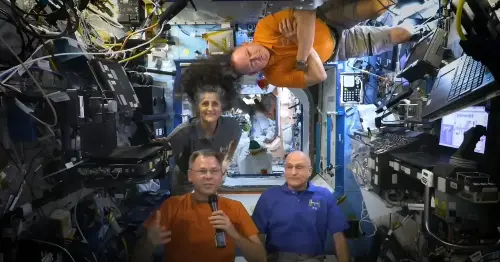
Astronauts on the International Space Station won’t be back home on Earth Thursday to celebrate Thanksgiving, but they will share a meal together with at least some traditional fare.
NASA astronaut Nick Hague noted, however, that tradition might “look a little bit different” in the orbiting laboratory in zero gravity.
In a live stream Tuesday, he and other members of the NASA Expedition 72 crew pulled out a container of food, some of which then floated around them in the weightlessness of space.
“We’ve got brussel sprouts, butternut squash, apples and spice,” Hague smiled with fellow crew members Suni Williams, Butch Wilmore and Don Pettit.
“Smoked turkey!” Williams chimed in.
“It’s going to be delicious,” said Hague.
The crew also shared messages of gratitude.
“We’re thankful for zero gravity; it’s fantastic!” said Wilmore.
“We’re grateful for a nation that is a space-faring nation, that lets us live free, say what we think is important to say,” he continued.
“Happy Thanksgiving to all our friends and family who are down on Earth and everyone who is supporting us!” Williams exclaimed.
Thanksgiving celebrations have taken place in space for decades.
Skylab 4 astronauts Gerald P. Carr, Edward Gibson and William Pogue made up the first crew to celebrate the holiday in space on November 22, 1973. Skylab was the nation’s first space station. Crew members shared two meals at dinner time, although neither included special Thanksgiving food.
Twelve years passed before the next orbital Thanksgiving celebration in 1985. The seven-person crew of STS-61B ate shrimp cocktail, irradiated turkey, and cranberry sauce aboard the space shuttle Atlantis.
Mexico’s Rodolfo Neri Vela introduced tortillas to space menus, and they have remained favorites among astronauts ever since.
More than 10 years later, the international crew chowed on smoked turkey, freeze-dried mashed potatoes, peas, and milk. In 2001, crews gobbled up smoked turkey and mashed potatoes as well, with the addition of green beans with mushrooms and blueberry-cherry cobbler.
Smoked turkey packages are heated in the Galley Food Warmer. There are no refrigerators in space, but scientists are working on how to provide them.
Food in space has evolved from bite-sized cubes, freeze-dried powders, and semi-liquids packaged in aluminum tubes. While some foods can be eaten in their natural form, others are dehydrated to prevent them from spoiling. Astronauts just need to add water to rehydrate them.
All food is precooked or processed, with the exception of fruit and vegetables.
Using rehydratable food and drinks also significantly reduces weight.
© Independent Digital News & Media Ltd
